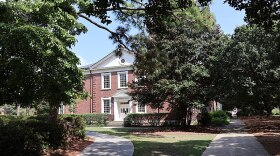The UNC System is considering creating an institution-wide policy for protests on public university campuses.
The proposal comes after several pro-Palestinian protests and encampments at UNC System institutions earlier this year. Students, faculty, and community members led demonstrations at N.C. State University, UNC-Asheville, UNC-Chapel Hill, and UNC-Charlotte.

The largest encampment at UNC-Chapel Hill lasted for several days, eventually leading to arrests and an intense clash between police and protesters.
Protesters have continued to lead demonstrations throughout the year, on campus streets, during board meetings, and in classrooms. This has included marches, pickets, and messages painted on university buildings.
According to state law, students and faculty are allowed to "assemble and engage in spontaneous expressive activity" as long as it doesn't "substantially disrupt the functioning" of a university.
But when protests happen, each university handles them differently.
At UNC-Chapel Hill, Chancellor Lee Roberts and other administrators suspended students, barricaded parts of campus, and temporarily closed the university’s 160-year social justice hub.
UNC-Charlotte's administrative team also suspended multiple students and UNC-Asheville's Chancellor Kimberly van Noort updated her campus rules to require prior approval for overnight demonstrations.

These chancellors and several others met with the UNC Board of Governors on Wednesday to go over "best practices" for handling campus protests. The list, drafted by the UNC System's legal team, includes:
- Prior approval to use campus spaces
- Restricting gatherings within 50 feet of classroom entrances
- Making campus public safety officials the "final decision makers" for gathering reservations
- Mandating that if a student breaks the conduct code while on another campus, they face punishments at their campus
- Violations of state or federal law are also considered violations of student conduct
- Requiring student conduct processes to be handled by professional staff instead of being peer-led
Leaders differ on who should set up protest policies
Chancellors and members of the BOG had differing opinions about who should set campus protest policies.
BOG Chair Wendy Murphy said she believes "bad behavior" should be handled the same on all system campuses.
"We've got to come up with guardrails and common sense practices that take out all that chaos that we have had," Murphy said. "And the expectations need to be clear across the system."
BOG member Randy Ramsey said he also thinks the suggestions are "simply common sense."
"It might be helpful from the Board of Governors to have a policy, to help support our campuses in these areas," Ramsey said. "I would ask any chancellor in the room – do you see something wrong with any policy here that would put you in a difficult position on your campus, something that you wouldn't adopt on your campus?"
Chancellor Bonita Brown, who runs Winston-Salem State University, said at least one of the proposed policies – requiring federal and state violations to be a violation of student conduct – are concerning to her. She said a regulation like this could be especially harmful for some students.
"Particularly (with me) leading an HBCU, those violations would have to be defined," Brown said. "I think that's very broad, and it would just tie up our resources all the time, probably endangering some of our students. … I admit that some of these are common sense, but the devil is in the details."

BOG member Swadesh Chatterjee said he believes policy changes should be up to individual chancellors.
"One size does not fit all," Chatterjee said. "I don't think the Board of Governors needed to get involved to set up a policy, because it should be delegated to the chancellor."
UNC-Pembroke Chancellor Robin Cummings said creating policies like this are both a "matter of resources and circumstances."
"UNC-Pembroke is very different from UNC-Chapel Hill," Cummings said. "One size doesn't fit all in this situation. I don't disagree with the need for this, but the implementation to me is going to be the key to success."
BOG member Woody White said the differences between campuses' enforcement points to why uniformity is needed.
"We've witnessed, myself firsthand, people masking themselves with goggles and shielding their identity, engaging in hate speech, vandalism," White said. "We can observe with our own eyes that there were violations of state law and student code of conduct. Did anyone pay any repercussions for that?"
"A law that's not enforced is incentivized to be broken over and over and over again," said White.
Chair Wendy Murphy said the UNC System recognizes students' freedoms and rights to protest, but also has a responsibility to prevent "chaos and vandalism."
"We've got to make sure we don't have chaos which creates a challenge for those just trying to go to class," Murphy said. "We don't know that there'll be a system-wide policy, but we think we can learn from other campuses."
UNC System President Peter Hans will instruct chancellors to review the policy suggestions and compile a list of feedback for the BOG's next University Governance committee meeting.
University Governance Chair Alex Mitchell is also instructing the System's legal team to survey chancellors on their masking policies to see "what best practices may be out there."
The next Board of Governors meeting is set for January.
WUNC partners with Open Campus on higher education coverage.












